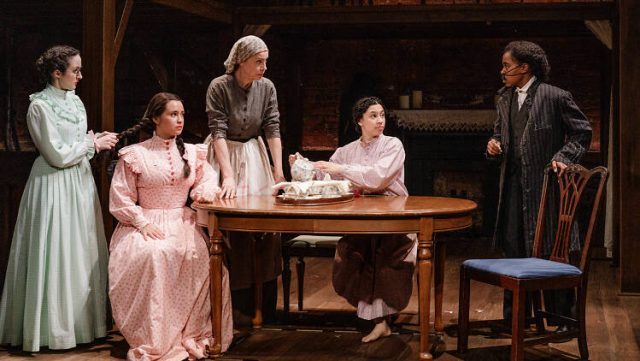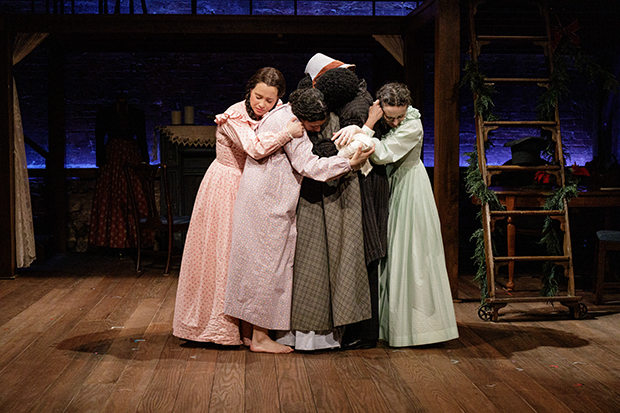
Kate Hamill adapts Little Women for the twenty-first century and plays Meg (far left) (photo by James Leynse)
Cherry Lane Mainstage Theatre
38 Commerce St.
Tuesday – Sunday through June 29, $82-$152
212-989-2020
primarystages.org
www.cherrylanetheatre.org
Kate Hamill strips down Louisa May Alcott’s classic semiautobiographical children’s book, Little Women, to its bare essentials in her self-described “radical adaptation,” a Primary Stages production continuing at the Cherry Lane through June 29. Hamill, who previously wrote and starred in dynamic versions of Jane Austen’s Sense and Sensibility and Pride and Prejudice and William Makepeace Thackeray’s Vanity Fair, explores gender identity and traditional male and female roles as it relates to both the mid-to-late nineteenth century and today. The story zooms in on Jo March (Kristolyn Lloyd), a tomboy who wants to break out of her family’s small world by going to college, becoming a writer, and traveling through Europe. She lives with her mother, known as Marmie (usually Maria Elena Ramirez, although I saw Mary Bacon, who also plays Aunt March), who understands the significant differences among her children; the oldest sister, Meg (Kate Hamill), already a spinster at sixteen; the sweet but sickly thirteen-year-old Beth (Paola Sanchez Abreu); the youngest, twelve-year-old Amy (Carmen Zilles), who is determined to find her Prince Charming; and their maid, Hannah (Ellen Harvey, who also portrays Mrs. Mingott), who is pitching in more than ever while the family patriarch, Robert March (John Lenartz), is off fighting for the Union in the Civil War.
Fifteen-year-old Jo develops an intimate friendship with their new neighbor, Laurie (Nate Mann), an effeminate piano-playing orphan who lives on a large estate with his wealthy grandfather, Mr. Laurence (Lenartz), and is being tutored by John Brooks (Michael Crane, who also plays the nasty parrot). The tutor is preparing Laurie for upper-middle-class manhood: college followed by heading up the family business, which he is loathe to do. “I’m not very good at being a, you know, a ‘lady,’” Jo, who shortened her name from the more feminine Josephine, says to Laurie, who prefers being called that instead of his more masculine given name of Theodore. “I’m not very good at being a ‘gentleman.’ So perhaps we should — be ourselves,” he says. They are mirror images of each other, both wanting to further their education and travel overseas while just being their not-so-cisgender selves, an option open to them in 2019 but not in the 1860s.

The March family needs a group hug in Primary Stages production at the Cherry Lane (photo by James Leynse)
Hamill has excised many supporting characters and changed several key plot points in order to focus more on the family dynamic and the individual sisters’ relationships. “You’re all growing up so fast,” Marmie says. In fact, the word “grow” is used extensively throughout the play. “In this story, they never grow up. They just stay the same, and it lasts forever,” Jo tells Beth when she’s about to read her one of her tales. “Nothing lasts forever,” Jo responds. “We all grow up, eventually,” Laurie says later with a tinge of sadness. “One isn’t better than the other. They just need different things to grow,” Marmie says about flowers but referring to her children as well. Meanwhile, Hannah explains, “Took care of all of you since you were babies. Each one of you growing different than the other.” In Hamill’s view, as kids head toward adulthood, they don’t have to follow societal norms and do what’s expected of them; they can make their own choices, follow their dreams.
Purists shouldn’t be worried; this is still Alcott’s Little Women, even as it’s reclaimed by Hamill, whose mother first gave her the book when Kate was reaching puberty. She is not reinventing or reimagining it so much as bringing a contemporary perspective that is refreshing while still remaining true to the heart of the novel. The play, which, even with its changes, sticks more to the original story than Hamill’s previous works, is briskly directed by Sarna Lapine on Mikiko Suzuki MacAdams’s two-level set, the upstairs containing Jo’s writing desk and Beth’s bed, the main floor serving as multiple locations with very minor adjustments. Lloyd (Dear Evan Hansen, Paradise Blue) is superb as Jo, prancing about with a fake mustache, wearing men’s clothes (the fine period costumes are by Valérie Thérèse Bart), and determined to make something of herself, but as a person, not specifically as a woman. In his New York debut, Mann, a recent Juilliard grad, is wonderful; he and Jo practically melt into each other. And Hamill is a cool Meg, giving her more weight in this adaptation. The play also features a lovely piano score by Deborah Abramson, which works its way into the narrative. We can’t get enough of Hamill’s ingenuity and can’t wait to see which classic she tackles next.